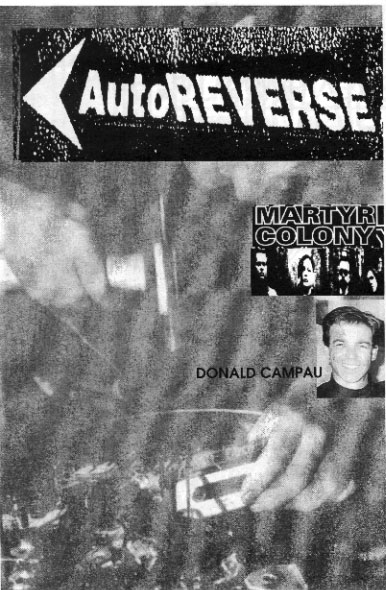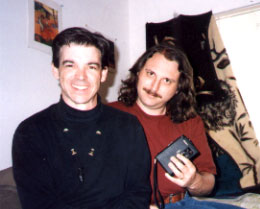AUTO2 spring 1996

don campau interview
Which
came first, Don Campau the cassette artist or Don Campau the guy with the
radio show?
Both began long ago, but I was a musician first and a radio announcer next.
In 1969 I started recording with my friend Geoff Alexander and our brothers
in an avant garde group called The Roots Of Madness. We made conceptual albums
on open reel tapes. Geoff already had a radio show on KTAO here in the Bay
Area and I was soon to follow. I had my first program around 1971. We were
lucky because we had a station owner, Lorenzo Milam, who was a world and classical
music collector so we had access to his collection early on. My current show
on KKUP came about in 1978 after the demise of KTAO. The hometaper thing went
into full swing in 1985 when I was finally able to get enough material to
do a full show of it. This all kind of came about because of magazines like
Op and early copies of Option and Sound Choice. It was cool that people got
reviewed and that they would trade tapes and give addresses.
Who
were some of your early contacts when you started in the tape-trading world?
I think my very first contact was Tom Furgas. He'd already been involved in
the tape scene for a while with his unique and eclectic tapes. I liked his
quirky go-for-anything-loopy approach. Others like Ken Clinger, Dino Dimuro
and Kevyn Dymond followed shortly thereafter. Also I did a lot of trading
with Al Margolis in NY. Early on he was the king of cassettes. Once I got
my toe in the door of the tape world and once people found out I had a radio
program devoted to this I had no lack of material. In fact it snowballed into
something I could barely afford and I could no longer trade with everybody.
Is
all of your stuff done on 4-track, or have you recorded in professional studios
too?
The only time I was in a pro studio was in Germany when I recorded with Lord
Litter, Andreas Bick and Kevyn Dymond on a 16-track. Other than that it's
all been 4-track except when I've gone over to people's houses to record on
8-track from time to time. Of course I've done a few mail collaborations too.
I just finished PEN PALS 2, which features a bunch of hometapers from around
the world.
What's
been the most popular release on your label Lonely Whistle?
Tough to say on that one, but I remember sending out a few hundred copies
of PEN PALS 1 and also a two tape set I did in 1986 called PINATA PARTY. That
was quite an elaborate package involving not only the problem of dubbing two
tapes but a special lunch bag piñata to sent it out in. The work was
enormous. My tape MIXED MESSAGES did quite well too, at least a couple hundred
of that one.
When
did Lonely Whistle start?
It began in 1984. I'd already been doing music for years of course, but when
I began trading actively, I thougt it would be nice to re-mix and package
the works I already had done into album form and make a catalog of these and
also release some material from musician friends and make a label! I had a
tremendous backlog of stuff.
What
are your favorite Lonely Whistle releases?
I've been lucky to be associated with some really talented people who've put
out some quality releases. Greg Gray's BIG BACON tape is a favorite. It's
a tasty instrumental tape. Of course Dino Dimuro's work is endlessly fascinating
to me and I've been lucky to have him do special tapes for me. He's one of
America's best hometapers. He's compared often to Zappa or Beefheart but he's
also influential in his own way. I also have great releases by Sack, an unusual
performer from Germany who does neat little songs. And I distribute some stuff
stateside for the IRRE label out of Germany. They have a wide-ranging catalog.
Matthias Lang, who runs IRRE, is one of the true veterans of the underground
music scene. Recently he curtailed his label activities to concentrate on
other things. Like me, he's got a family to care for and it becomes a bit
much at times.
How
did the other international releases on Lonely Whistle come about?
In addition to Matthias, I also came into contact with people like And Xport
in Britain, who allowed me to distribute some things and also individual artists
like Gypsy and Pierre Perret. Some of these people are now out of the scene,
but I continue to offer their releases. In 1989 I was approached by Stephen
Parsons to help run KFR, an international tape network. Lord Litter also had
a big hand in that. I've been lucky because of the work I did a few years
ago and the publicity it generated. People have contacted me many times in
regard to specific projects. I don't want to forget Jan Bruun, who has been
a major force in Norway, distributing underground artists worldwide on his
label Hypertonia.
What's
next for your label?
Right now I'm concentrating on PEN PALS 2, which is coming out as we speak.
Also I plan to release some things with my new wife Robin O'Brien as soon
as possible. She's a great singer. By the way: we met, courted, and initially
came into contact because of the hometaping scene. How's that for a story?
I'm also happy to announce a new 20-minute tape by my daughter Nicole. Her
style has changed greatly from her first tape seven years ago. It's haunting
solo vocal material with instrumental backing by yours truly.
What
has the reaction to your radio show No Pigeonholes been locally?
There has been some interest here in the Bay Area but the impact here has
been minimal, I think. I have never spent a lot of time soliciting local music,
although I welcome it. I never thought of my show as "The Local Amateur
Hour." The concept of the show was to showcase individuals who would
work in their homes, wherever that was: a basement in Ohio, a garage in California,
a flat in Britain, etc. The connection of these decentralized elements interests
me.
How
do you select material for the show?
I accept all styles of music, poetry, sound, or whatever for the program.
I listen to the stuff and pick the material I like best. I play all tapes
submitted. I may not give major rotation to an artist or tape but I end up
playing something from everyone. I try to make the show entertaining, informative
and well-paced.
What
plans do you have for No Pigeonholes?
I just continue to present the material. Although I suppose the scene has
changed greatly over the last few years. Now I get more independent CD and
fewer cassettes. To me though, it has never been about the format but about
the idea of doing your own productions by yourself and with friends. I do
get quite a few demos from bands now and at first I wasn't sure what to do.
Early on I decided I would still air these things even though they may not
have been home recordings. There are so many shades of grey here: people or
bands that don't have the money for home recording gear, one time projects,
live recordings, etc. I figured it was my show and I could do whatever I wanted.
Still, I do prefer home tapes because it personally interests me the most.
One exciting thing lately is that my show is now being rebroadcast on Radio
Marabu, a shortwave collective in Germany. They also do local FM broadcasts
and satellite broadcasts. It's neat to know that I'm sending out these weird
sounds all oven the world. And remember, I'm always looking for new stuff
for the show. Write me and send your tape/vinyl/CD. Now you'll get airplay
all over the place. My pal Dan Fioretti has also told me he's going to set
up a website for No Pigeonholes. Though I don't know much about it yet, it
sounds like a good thing. I have already received a lot of mail from cyber
contacts due to Bryan Baker's Gajoob e-zine. Personally, I don't have a computer
yet. Maybe someday. But where will I find the time?
Any
brushes with the big-time?
Not really, but I was interviewed in the New York Times once! After that article
came out I got deluged with tapes and requests. Everyone asks me if anyone
I've played with ever went on to major success. Generally I'd say no, although
people like Amy Denio have gone on to much higher profile music careers.
How
does today's hometaping scene compare with that of the late 1980s?
It does seem that things have changed. There was a certain excitement about
the freedom it all meant. Self-production and release. It was all fresh and
new. There are a lot of people today who are unsatisfied with home recording
because eventually they want to make it in the music biz. They only do tapes
because they cannot yet afford their own CDs. They figure cassettes are a
stepping stone to successful music careers. Still, I get plenty of tapes from
people who are into it for creative expression. There are always new people
on the horizon willing to do it on their own without regard for financial
benefits or "big-time" status. And now, I get a lot of hometaped
projects that get turned into CDs. It still seems to me like it's too much
money to spend and too much inventory to keep around. I always thought one
of the great things about self-productions was that you could just make the
things as you needed to and not tie up a lot of funds with hundreds of the
same thing in your garage. I thought it enabled you to do more projects and
to take more chances.

Don Campau with hometaping's answer to Ron Jeremy, Dino Dimuro